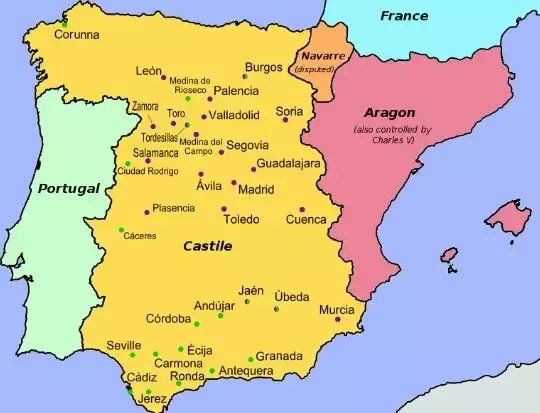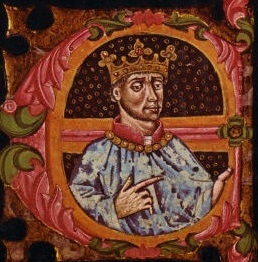It& #39;s Sunday night so here& #39;s entry #38 in #EuropeanBios: our subject is Isabella of Castille, who was pretty awe-inspiring so I hope to do her justice. She overcame centuries of sexism to become every bit the equal of her male peers in being a murderous, traitorous nightmare.
I like to find connections between my subjects and Isabella has two. First, she spent a great deal of her career fighting religious wars against Muslims, in particular the Ottoman empire. On her side in this battle was Vlad the Impaler: https://twitter.com/seldo/status/1360681251951185921?s=20">https://twitter.com/seldo/sta...
More importantly, Isabella was known as a warrior queen, a fiercely military ruler. Her church& #39;s attempts to retroactively make her warlike ways acceptable was to boost the images of other female warriors, including canonizing Joan of Arc: https://twitter.com/seldo/status/1356042940716486658">https://twitter.com/seldo/sta...
Isabella was born in 1451 to the king and queen of Castile, which is most of modern day Spain. She was second in line to the throne to her brother Enrique. As a girl child and not a direct heir nobody cared much when she was born, and there isn& #39;t much record of her childhood.
Spanish royal politics at the time were an absolute soap opera. There was bribery, patronage, endless political marriages, and above all there was murder. Poison was particularly popular and various people dropping dead at convenient times was a major feature of Isabella& #39;s life.
Isabella& #39;s older half-brother Enrique became king when their father died in 1454, when he was 29 and she just 3. He controlled her life, denied her money left to her by their father and promised her in marriage to other men for political gain. Isabella was not a fan.
Isabella also had a younger brother, Alfonso, who like Isabella was kept on a tight leash and under control. Alfonso& #39;s birth bumped Isabella down another notch to third in line for the throne (second after their father died), making her even less important to everybody else.
[As a side note: all of these folks had Spanish names like Juan, Juana, Enrique, etc. but are in historical records for some reason known by their anglicized names: John, Joanna, Henry, etc.. It& #39;s weird and totally unnecessary and makes for confusing googling]
Isabella secretly got married, aged 18, to Ferdinand 2, heir to the throne of neighboring Aragon. This was a pretty good move politically anyway, and also they were RIDICULOUSLY HORNY for each other, constantly banging in a way that made contemporary record keepers blush.
Ferdinand was, like basically every other member of European royalty after centuries of alliance marriages, Isabella& #39;s cousin. It meant to get married they had to get dispensation from the Pope, which they did with a forgery which Isabella replaced with a real one years later.
King Enrique meanwhile had some problems of his own. He was gay*, which meant that his marriages did not bear a lot of children, leading to his nickname of "Enrique the Impotent". His first marriage was childless.
* Standard caveats apply in re: historical queer identity
* Standard caveats apply in re: historical queer identity
Enrique annulled his first marriage and got a second wife, Juana, but failed to consummate his marriage to her either. We know this because there was, as was custom at the time, an audience of officials in their bedroom on their wedding night, hoping to witness the event.
Eventually Juana did have a baby girl, also called Juana, but the evidence suggests Enrique was not her father. Her real father was probably Beltrán de la Cueva, a bisexual favorite of the king& #39;s who had apparently also managed to find time to please the queen as well. Drama.
Isabella& #39;s younger brother Alfonso died aged 14. He was probably poisoned by Enrique& #39;s wife, Queen Juana, who wanted her daughter Juana to be second in line to the throne instead and so bumped off her husband& #39;s own brother. Like I said, European royal politics was cold-blooded.
But now there was a big question: who had the better claim to the throne? A male heir wouldn& #39;t be questioned, but there was none. Isabella, a woman but definitely daughter of the former king, or little Juana, also a woman, but probably not actually daughter of the current king?
Isabella solved this problem with determination. She ingratiated herself with various high-ranking nobles and clergy, dished out favors, and then after years of refusing to see each other tearfully and lovingly reunited with King Enrique, whom she immediately poisoned to death.
Enrique took quite a while to die and so had a lot of time to plan his succession and leave a will but apparently, mysteriously, did not do so. Or so claimed everyone who was at his bedside, all of whom had been previously bought off by Isabella.
Those same nobles and clergy then immediately declared Isabella Queen. She crowned herself one day after Enrique& #39;s death in a grand and elaborate ceremony that, observers noted, had clearly been planned several months in advance.
She got crowned so quickly, in fact, the her husband Ferdinand didn& #39;t hear about it until several weeks later, and even then only because somebody wrote to him saying how happy they& #39;d been to be able to participate in the ceremony.
Isabella was slow to notify Ferdinand on purpose, because she wanted to be Queen in her own right. She had planned this YEARS in advance, making him sign a document at their teenaged marriage that promised that if she became queen he would be consort, and not actual king.
This infuriated Ferdinand, who felt he had been emasculated. To mollify him, and as a shrewd piece of public relations for a sexist world, Isabella got him to sign an agreement that while she was the real ruler, in all external documents they would appear co-rulers.
This is why when you hear about Christopher Columbus he was funded by "Ferdinand and Isabella". That their names would always be spoken together and that Ferdinand& #39;s name would always be listed first was part of the agreement she got Ferdinand to sign.
Whether this agreement worked out for Isabella is an open question. She got what she wanted: the real power. But sexist historians for years assumed that, as a king and queen, Ferdinand was doing all the actual ruling. This impression changed only quite recently.
I don& #39;t know if I need to emphasize this, but this is all amazing! Gay kings! Bisexual courtiers! Everybody poisoning each other! It was high drama worthy of an HBO series and they were just getting started; Isabella was still only 23.
Unfortunately the rest of Isabella& #39;s life is less fun drama and more standard European royalty in the 1400s, which is to say a great deal of war. She went to war with Portugal, but she especially went to war with Muslims everywhere.
Isabella was Catholic; extremely Catholic. More than nearly any other royalty at the time she considered the Ottoman empire and the Muslim faith in general a dire existential threat, and as we have already noted, Isabella had NO CHILL when it came to getting what she wanted.
So she funded a ton of wars, in particular the retaking of Granada, in the south of Spain, which had been held by Muslims for hundreds of years. And it was bloody and ruthless and in the process Isabella became a master of military logistics.
She and Ferdinand formed a terrifying power couple in which Ferdinand led troops in battle and she told them where to go and made sure they were funded, fed and clothed, which any military leader will tell you is by far the harder part.
Fun fact: around this time the rules of chess evolved to a form called "Queen& #39;s chess", in which the Queen is the most powerful player. This change was a direct response to Isabella& #39;s rule. She is *the* queen in the game of chess. Not bad.
Isabella was exceptionally good at administration in general. She brought justice to a kingdom that had devolved into lawlessness, making her very popular with the population. She fixed up the economy. She even established her own style of architecture.
But she also cemented her reputation as a bastard by starting the Spanish Inquisition*, a initiative that started off bad and anti-semitic and devolved into nearly indiscriminate murder.
* nobody expects the Spanish Inquisition to show up in a bio thread!
* nobody expects the Spanish Inquisition to show up in a bio thread!
No two ways about it: she was a religious bigot, vicious to both Jews and Muslims, responsible for thousands of deaths in wars and also at the hands of the Inquisition. This was standard European royal behavior, of course, but that doesn& #39;t mean it was okay.
Finally, she was responsible for kicking off a literal and metaphorical gold rush for the New World by funding Christopher Columbus. This was an extremely astute economic move; it made Spain the richest kingdom in the world for centuries.
But Spain& #39;s wealth in the New World came at the cost of genocide; in fact many genocides in both north and south America. Europeans raped, pillaged and plundered the New World for centuries and it& #39;s impossible not to lay part of the blame for that at Isabella& #39;s feet.
Un-fun fact: you can also blame Isabella for syphilis, brought back from the new world by early Spanish explorers. Europeans had no immunity and started dying of it right and left; even her husband Ferdinand, who was constantly having affairs, caught it.
Isabella died of cancer aged 53 after having a ton of kids whom she placed into cunningly arranged political marriages that firmly established her dynasty and Spain& #39;s power in Europe. They became kings and queens of Spain, Portugal and England.
So Isabella& #39;s legacy is complex. She overcame sexist opposition and long odds and certainly left her mark on the world, though the mark is in her case a bloodstain. She was awe-inspiring but not, to be clear, awesome.
P.S. if you are looking for a full list of all the bios I& #39;ve read in this project, that& #39;s here along with a timeline and links to all the twitter threads: #gid=0">https://docs.google.com/spreadsheets/d/1iCVT3U6nSpHSD1fHDGOncEKoi_SS-ZJhQc7r0PAEqZ4/edit #gid=0">https://docs.google.com/spreadshe...

 Read on Twitter
Read on Twitter




